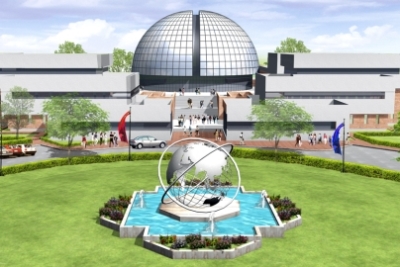Indian research centre takes shape
03 January 2014
A ceremony has been held to mark the start of construction of the Global Centre for Nuclear Energy Partnership (GCNEP) near Delhi, India. The centre will support international cooperation in nuclear energy applications.
 |
An artist's impression of how the main building of the GCNEP will appear
(image: GCNEP) |
The centre being built near Bahadurgarh in Haryana state will strengthen India's cooperation with the international community. It will house five schools to conduct research into advanced nuclear energy systems, nuclear security, radiological safety, as well as applications for radioisotopes and radiation technologies.
Training facilities are to include virtual reality laboratories and a radiation monitoring, calibration and accreditation laboratory. The GCNEP will be used for research by Indian and visiting international scientists; training of Indian and international participants; international seminars and group discussions by experts on topical issues; and, development and conduct of courses in association with interested countries and the International Atomic Energy Agency (IAEA).
Indian prime minister Manmohan Singh, who today was present for the laying of the centre's foundation stone, said that India aims to continue strengthening the security of its nuclear power plants and nuclear materials. This, together with the development of human resources in the field of nuclear energy, will be an important objective of the GCNEP, he said.
Singh to retire
Manmohan Singh announced that he will retire if his Congress party wins the next election, expected later this year. He has been India's prime minister for almost a decade.
Speaking at a press conference following his announcement, Singh spoke about the highlights of his time as prime minister. He was cited as saying by NDTV, "Certainly I think the best moment for me was when we were able to strike a nuclear deal with the United States to end the nuclear apartheid that had sought to stifle the processes of social and economic change and technical progress of our country in many ways."
India and the USA signed a civil nuclear cooperation agreement in 2008 after the international Nuclear Suppliers Group agreed to relax international nuclear trade restrictions against India.
He noted that the centre will be boosted by bringing together Indian and international scientists for their research and training programs. "To accomplish these aims, we have the IAEA and Russia, while working together with countries such as France and the USA."
The Indian government announced in September 2010 that it had approved the establishment of the GCNEP. It will be the sixth R&D unit under the aegis of the Department of Atomic Energy. In June 2011, Russia signed an agreement with India to cooperate on establishing four of the GCNEP schools.
"India is one of the few countries in the world which has developed technology to detect nuclear power plants and has also acquired the ability to produce nuclear fuel," Singh noted. "Our goal is to build 27,000 MWe of nuclear power generating capacity within the next ten years."
Researched and written
by World Nuclear News